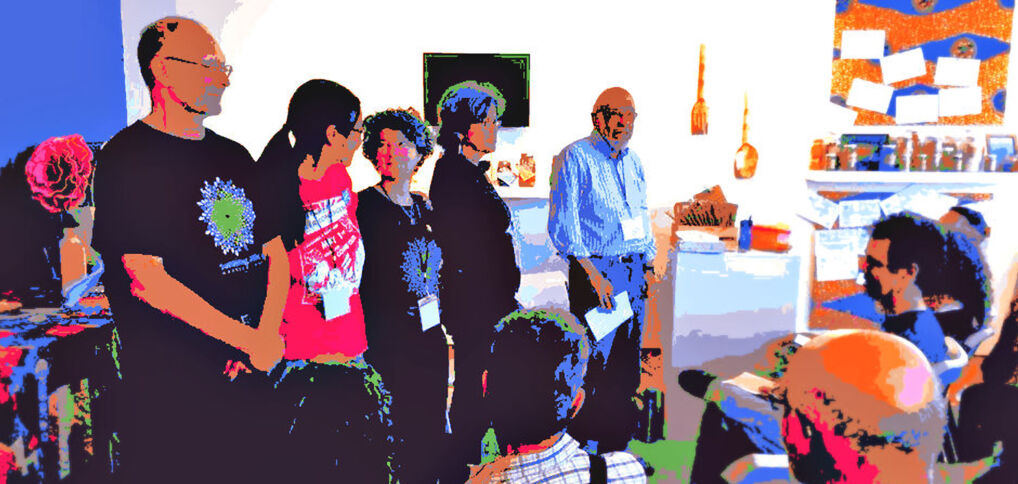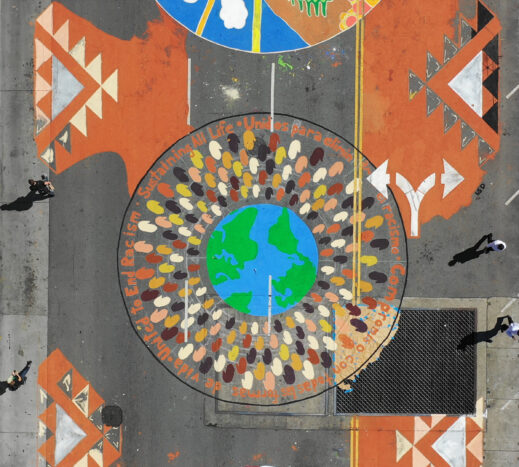
View this resource
as a PDF>>>
****
View this resource
in French>>>
****
View this resource
in Spanish>>>
The climate emergency affects everyone. It threatens our world and our future. Turning climate change around can only be accomplished though broad-based coalitions that cross all lines of division including: racism, classism, sexism, Anti-semitism, Islamophobia, ageism, LGBTQ+ oppression. Jews can and need to be an integral part of this coalition.
The origins of the Jewish people are inextricably connected to the natural world, including a commitment to ethical relationships with the land, animals, and all peoples. However, in the different lands and time periods in which Jews have lived, we have been targets of genocide, prohibited from owning land, and exiled from our countries. As part of the climate justice movement, Jews can reclaim our relationship to land in cooperation with all the world’s peoples.

As a people now spread over all of the earth, Jews are of all races and ethnicities. Jews are Mizrahi, Sephardi, Ashkenazi; we are religious and secular. Jews are white, Native and Indigenous people and Global Majority people,* young and old, of all class backgrounds.
Jews are a people of broad diversity who have survived genocide and exile and carry intergenerational trauma. Jews can heal from this trauma and build greater unity amongst our own people. As we build unity, we will be better able to take on antisemitism alongside racism and other oppressions and support and follow the leadership of frontline communities, including poor people, Global Majority, Indigenous and tribal peoples within the climate justice movement.
Anti-Semitism2 is the institutionalized mistreatment of Jews and the singling out of Jews for blame for many of the world’s problems. Jews have been continually scapegoated to protect the interests of the ruling classes. Although anti-Semitism inflicts terror and violence against Jews, it is aimed at all working people: historically, anti-Semitism has divided the working class and diverted them from organizing effectively to secure equal access to the world’s resources.

The timing of the current rise of antisemitism is not random. It is occurring when income inequality is at a high. Unions have less power, neo-fascism3 is rising, immigrants and other groups are being attacked. In these increasingly desperate economic and climate conditions, feelings of anger and betrayal among working people can be diverted into a search for scapegoats. Working class people need information on how anti-Semitism operates in order to recognize it, speak out against it, and prevent it from dividing our movements —including the movement to restore our environment.
In many progressive movements, issues around Israel have become divisive. Criticism of the policies of the Israeli government towards the Palestinian people is not anti-Semitism. But singling Israel out for blame for the complex difficulties in the Middle East can be an aspect of anti-Semitism and can play an unnecessarily divisive role in liberation movements globally. It is important to have climate activists understand how anti-semitism operates so it cannot be used to derail the climate justice movement.
Jews can and must bring our long history of progressive organizing to the climate justice movement. Anti-Semitism has in the past led many Jews to remain invisible as Jews in our movement activism. It is crucial now for Jews to be fully active in climate justice work, visible as Jews, and fighting alongside all other oppressed groups.
1 The peoples of Africa, Asia, the Pacific Islands, the Caribbean, and Latin America, and those descended from them, are over eighty percent of the global population. These people also occupy most of the global land mass. Using the term “Global Majority (GM)” for these people acknowledges their majority status in the world and interrupts how the dominant (U.S. and European) culture assigns them a minority status.
Many Global Majority people living in dominantculture countries have been assimilated into the dominant culture—by force, in order to survive, in
seeking a better life for themselves and their families, or in pursuing the economic, political, or other inclusion of their communities. Calling these people “GlobalMajority” contradicts the assimilation.
2 While the term antisemitism is not precise (there are also Semitic peoples who are not Jews), it is the term that has been widely used to refer to the specific oppression directed against the Jewish people.
3 Neo-fascism is an ideology and political culture that includes ultra-nationalism, white supremacy, authoritarianism, male domination, xenophobia, opposition to immigration, and the strategic erosion of basic democratic rights of citizenship, voting, independent press and judicial system, enacted through violence, intimidation, and cult of personality and propaganda.


